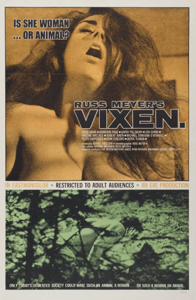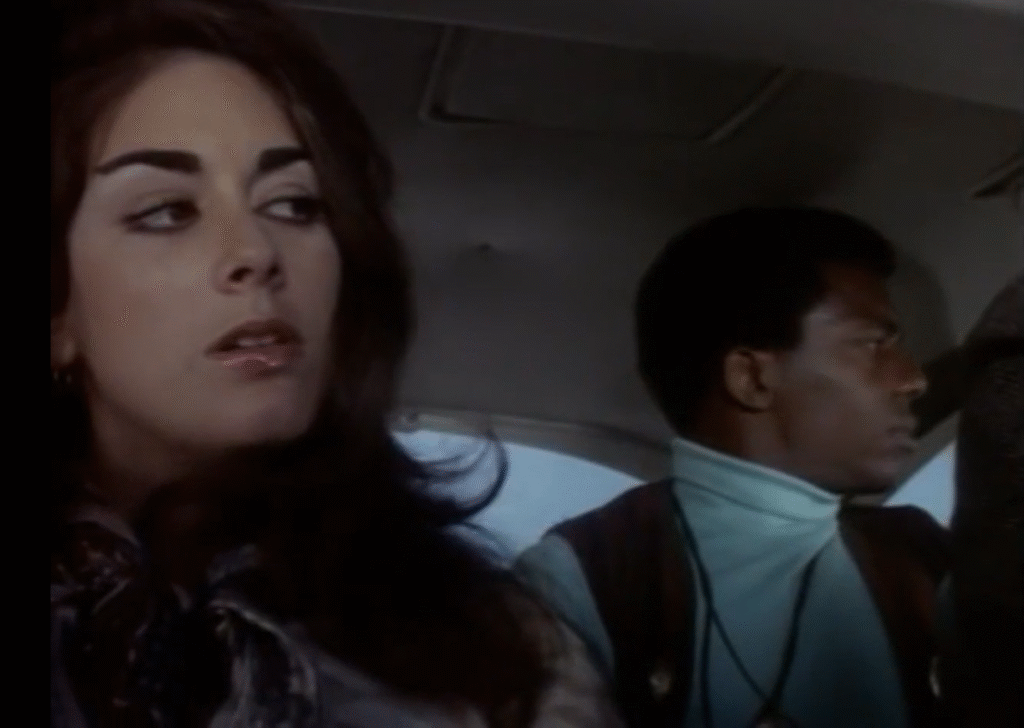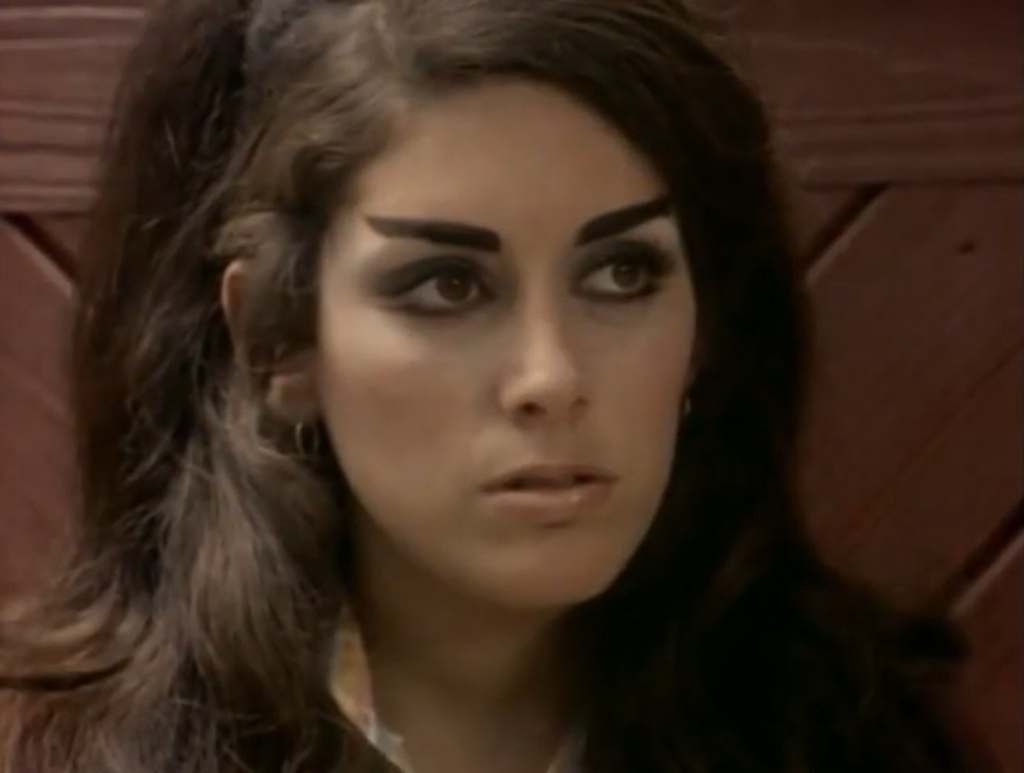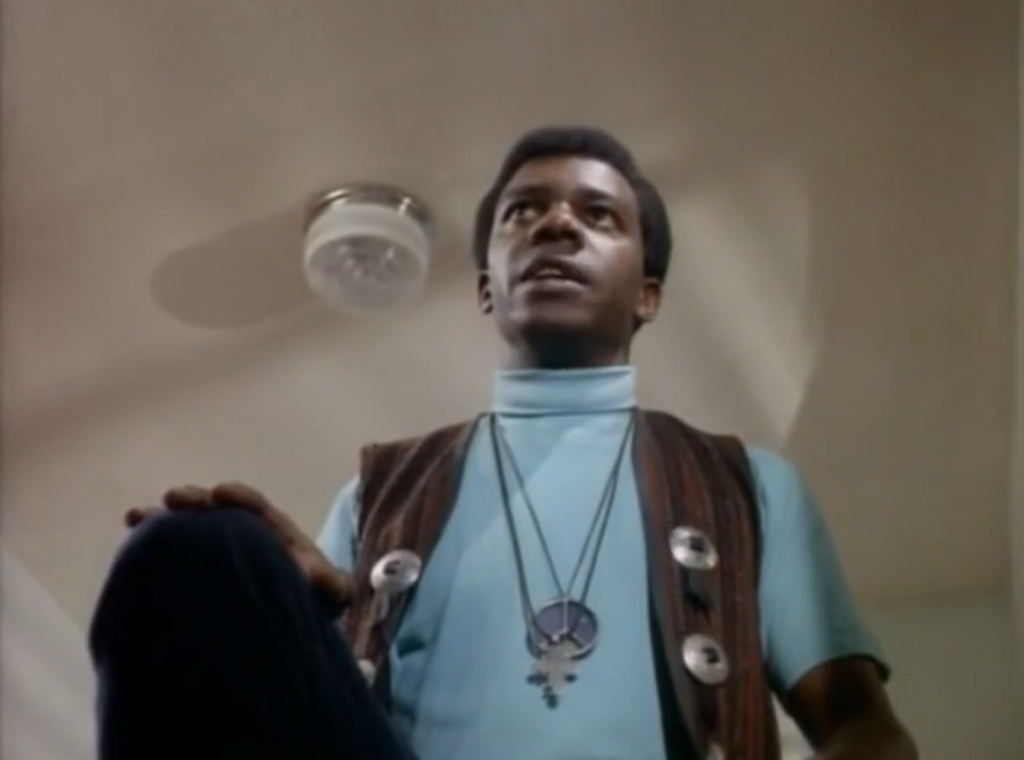|

Synopsis:
A deeply racist woman (Erica Gavin) whose bush-pilot husband (Garth Pillsbury) is clueless about her infidelity has sex with a Canadian mountie (Peter Carpenter) and both members of a couple (Vincene Wallace and Robert Aiken) who have chartered a ride with Pillsbury. Next, Vixen (Gavin) dares her own brother (Jon Evans) to have sex with her, and mercilessly hassles Evans’ African-American, draft-evading friend (Harrison Page) — but when an Irish Communist (Michael Donovan O’Donnell) hires Pillsbury for a special trip and Page comes along, Gavin finds the tables turned.
|
|
Genres, Themes, Actors, and Directors:
- Infidelity
- Racism and Race Relations
- Russ Meyer Films
- Strong Females
Response to Peary’s Review:
Peary provides significant historical context for this “landmark soft-core sex film from ‘King of the Nudies’ Russ Meyer”, which “bypassed [the] stag-movie circuit for long runs in major theaters” and “made what was probably [the] biggest rate of profit on investment in independent-film history until Halloween — playing in some theaters for over a year, and making history at one drive-in where it sold several times more tickets than the town’s population” (!!!). He writes that “in its own way, it had [the] impact of and paved the way for Deep Throat,” becoming “the subject of many articles” and with “star Erica Gavin [doing] the talk-show circuit, taking on the likes of Betty Friedan, who insisted Meyer had exploited Gavin.” (Apparently “years later Gavin agreed.”) He asserts that “Gavin’s erotically charged performance surely is on the verge of being obscene”, and that this “is the perfect film for swingers”, though the “bizarre finale” temporarily diverts it from its “stag-movie plot”.

Unfortunately, while Peary concedes that Gavin’s Vixen is a “foul-mouthed, racist” woman, he nonetheless describes her as “Meyer’s best heroine”, and the reason this picture hasn’t “faded away by now”. He writes that “as the most aggressive female of them all, she does the best job of expressing a woman in sexual heat”, and apparently “proved to be a heroine even women viewers liked,” given that many “weren’t used to seeing cinema heroines be so confident, so aggressive, so free of sexual inhibitions.”

It’s sad to think that so many women in the late 1960s were willing to overlook Vixen’s abusively racist rhetoric towards Page (who gives the best “straightforward” performance in the film). While I understand that Vixen is meant to be over-the-top and uninhibited in every way — including, just for instance, seducing her grown brother — seeing so much toxic vitriol heaped upon the film’s one Black character is simply intolerable. I had a hard time getting through this one, and am frankly flabbergasted that it has maintained such a following.
Redeeming Qualities and Moments:
- Harrison Page as Niles

Must See?
Nope; steer clear unless you’re a diehard Russ Meyer fan.
Links:
|




One thought on “Russ Meyer’s Vixen / Vixen (1968)”
Not must-see.
~ though it’s notable as a particularly popular Meyer flick and, overall, Gavin ultimately shows herself to be among Meyer’s most unique female leads.
I understand the revulsion one would feel towards Vixen for being as blatantly racist as she is. Frankly, in a way, her being bigoted doesn’t seem to make a whole lot of sense. In fact, in view of what happens in the entire film, it seems to me that Vixen is against Niles more for being (in her eyes) anti-American – a draft dodger – than for being black.
As well, I imagine Vixen wouldn’t know the difference between communism and socialism and, if she ever found the time in-between sex bouts, would probably vote Republican.
But, strangely, Meyer himself appears to be against racism. Vixen’s vileness seems an excuse for Meyer to ultimately preach against bigotry. (At the end, though it’s tentative, Vixen and Niles come to an ‘understanding’.)
It’s worth noting that the lesbian sex on display contains the film’s longest and most sensitive illustration of sexuality (most of which – at her website – Gavin says she came up with herself since Meyer was at a total loss). Even the dialogue in that sequence is the best-acted. (Also at her website, Gavin says she eventually reversed her shamed-into stance that Meyer had exploited her.)
Though there are still two Peary-listed Meyer films that I haven’t seen, it’s most likely safe to say that only 3 are must-see (‘The Immoral Mr. Teas’, ‘Faster, Pussycat, Kill! Kill!’ and ‘Beyond the Valley of the Dolls’).
But even if ‘Vixen’ isn’t a must, there’s something about Gavin that should have been given more of a chance – outside of (basically) this, ‘Beyond the Valley…’ and Demme’s ‘Caged Heat’.